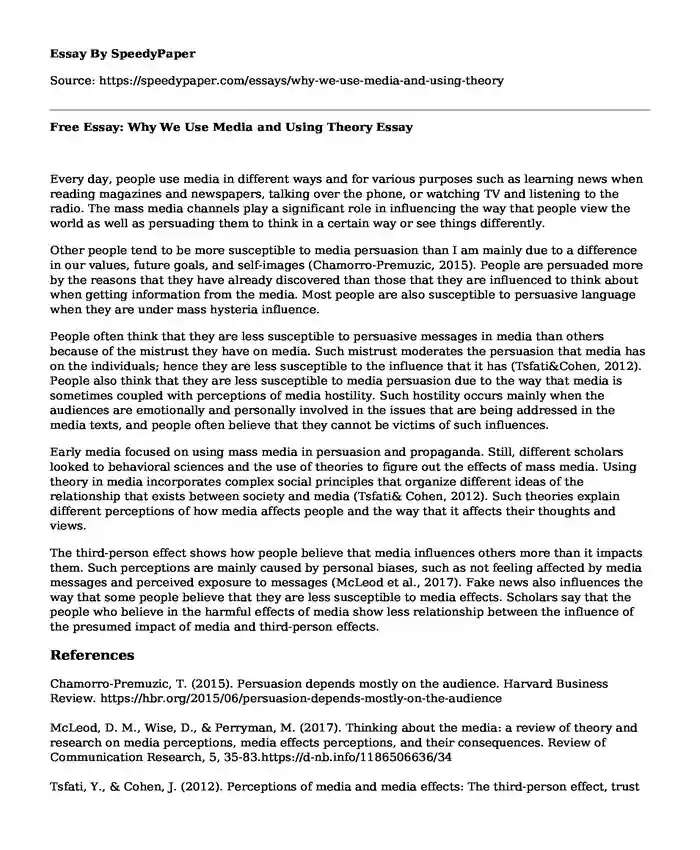Every day, people use media in different ways and for various purposes such as learning news when reading magazines and newspapers, talking over the phone, or watching TV and listening to the radio. The mass media channels play a significant role in influencing the way that people view the world as well as persuading them to think in a certain way or see things differently.
Other people tend to be more susceptible to media persuasion than I am mainly due to a difference in our values, future goals, and self-images (Chamorro-Premuzic, 2015). People are persuaded more by the reasons that they have already discovered than those that they are influenced to think about when getting information from the media. Most people are also susceptible to persuasive language when they are under mass hysteria influence.
People often think that they are less susceptible to persuasive messages in media than others because of the mistrust they have on media. Such mistrust moderates the persuasion that media has on the individuals; hence they are less susceptible to the influence that it has (Tsfati&Cohen, 2012). People also think that they are less susceptible to media persuasion due to the way that media is sometimes coupled with perceptions of media hostility. Such hostility occurs mainly when the audiences are emotionally and personally involved in the issues that are being addressed in the media texts, and people often believe that they cannot be victims of such influences.
Early media focused on using mass media in persuasion and propaganda. Still, different scholars looked to behavioral sciences and the use of theories to figure out the effects of mass media. Using theory in media incorporates complex social principles that organize different ideas of the relationship that exists between society and media (Tsfati& Cohen, 2012). Such theories explain different perceptions of how media affects people and the way that it affects their thoughts and views.
The third-person effect shows how people believe that media influences others more than it impacts them. Such perceptions are mainly caused by personal biases, such as not feeling affected by media messages and perceived exposure to messages (McLeod et al., 2017). Fake news also influences the way that some people believe that they are less susceptible to media effects. Scholars say that the people who believe in the harmful effects of media show less relationship between the influence of the presumed impact of media and third-person effects.
References
Chamorro-Premuzic, T. (2015). Persuasion depends mostly on the audience. Harvard Business Review. https://hbr.org/2015/06/persuasion-depends-mostly-on-the-audience
McLeod, D. M., Wise, D., & Perryman, M. (2017). Thinking about the media: a review of theory and research on media perceptions, media effects perceptions, and their consequences. Review of Communication Research, 5, 35-83.https://d-nb.info/1186506636/34
Tsfati, Y., & Cohen, J. (2012). Perceptions of media and media effects: The third-person effect, trust in media, and hostile media perceptions. The International Encyclopedia of Media Studies.https://onlinelibrary.wiley.com/doi/pdf/10.1002/9781444361506.wbiems995
Cite this page
Free Essay: Why We Use Media and Using Theory. (2023, Sep 20). Retrieved from https://speedypaper.net/essays/why-we-use-media-and-using-theory
Request Removal
If you are the original author of this essay and no longer wish to have it published on the SpeedyPaper website, please click below to request its removal:
- Violence as a Controversy in Films, Free Essay for Everyone
- Free Essay Focusing on Trump's Policies on Immigrants
- Paper Example. Abuse in the Shining
- Essay Sample: Childhood and Media
- Essay Example: Crime in the Suites, Class Law
- Antagonist Narrative. Essay Example
- China and Market Reform: Paper Example
Popular categories





